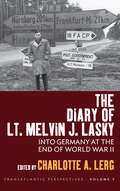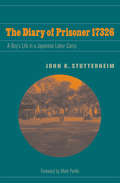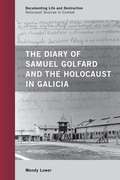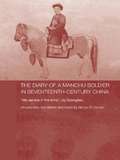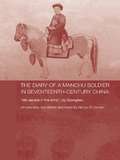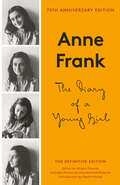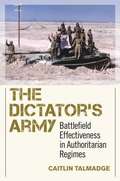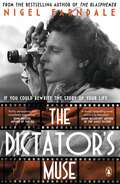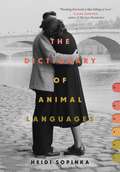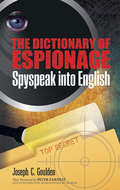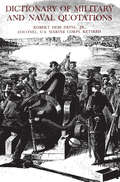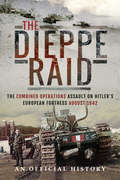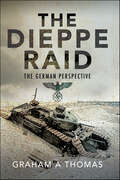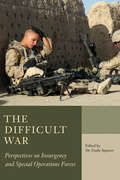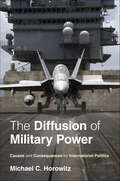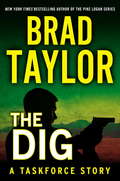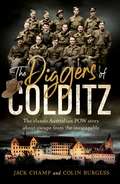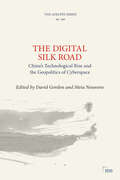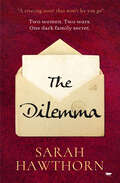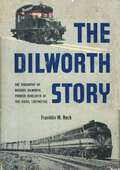- Table View
- List View
The Diary of Lt. Melvin J. Lasky: Into Germany at the End of World War II (Transatlantic Perspectives #7)
by Charlotte A. Lerg"'The Diary of Lt. Melvin J. Lasky' offers not only a panoramic view of a country poised between devastation and an uncertain future but a gripping self-portrait of a man poised between unresolved youthful bewilderment and a mature clarity of conviction." • Wall Street Journal In 1945 Melvin J. Lasky, serving in one of the first American divisions that entered Germany after the country’s surrender, began documenting the everyday life of a defeated nation. Travelling widely across both Germany and post-war Europe, Lasky’s diary provides a captivating eye-witness account colored by ongoing socio-political debates and his personal background studying Trotskyism. The Diary of Lt. Melvin J. Lasky reproduces the diary’s vivid language as Lasky describes the ideological tensions between the East and West, as well as including critical essays on subjects ranging from Lasky’s life as a transatlantic intellectual, the role of war historians, and the diary as a literary genre.
The Diary of Prisoner 17326: A Boy's Life in a Japanese Labor Camp (World War Ii: The Global, Human, And Ethical Dimension Ser. #20 B/w Illustrations)
by John K. StutterheimA moving memoir of childhood in Dutch colonial Java, coming of age in wartime, and the trauma of life in WWII Labor Camps run by the Japanese. As a boy growing up the Dutch island colony of Java, John K. Stutterheim spent hours exploring his exotic surroundings, taking walks with his younger brother and dachshund along winding jungle roads. It was a fairly typical life for a colonial family in the Dutch East Indies, but their colonial idyll ended when the Japanese invaded in 1942, when John was fourteen. With the surrender of Java, John&’s father was taken prisoner. Soon thereafter, John, his younger brother, and his mother were imprisoned. A year later he and his brother were moved to a forced labor camp for boys, where disease, starvation, and the constant threat of imminent death took their toll. Throughout all of these travails, John kept a secret diary hidden in his mattress. His memories now offer a unique perspective on an often-overlooked episode of World War II. What emerges is a compelling story of a young man caught up in the machinations of a global war—struggling to survive while caring for his gravely ill brother.
The Diary of Samuel Golfard and the Holocaust in Galicia
by Wendy LowerThe Diary of Samuel Golfard and the Holocaust in Galicia examines the contents and context of a rare diary written by a Jewish man from Nazi-occupied Poland. Serving as both a record and an artifact of Samuel Golfard’s life, the diary details his attempt to make sense of and resist the event that ultimately destroyed him. Wendy Lower integrates photographs, newspaper articles, documents, and testimonies to create a more complete picture of Golfard’s experiences and writings. She also traces the diary’s own journey after Golfard’s death, from 1943 Poland to the present day.
The Diary of a Confederate Soldier James E. Hall
by James Edmond Hall“James Edmond Hall (1841-1915) was born in Barbour County, West Virginia. In May of 1861 he joined a newly organized militia called the Barbour Greys, which was mustered into the Confederate Army as Company H of the 31st Virginia Volunteer Infantry. His diary records a common soldier's experience in the Civil War from major campaigns as part of the Army of Northern Virginia, to a Union prison, and finally Appomattox and the end of the conflict.”-Print ed.
The Diary of a Manchu Soldier in Seventeenth-Century China
by Nicola Di Cosmo DzengseoProviding original insights into Chinese military history, Nicola Di Cosmo gives an annotated translation of the only known military diary in pre-modern Chinese history, providing fresh and extensive information on the inner workings of the Ch'ing army. The personal experience of the author, a young Manchu officer fighting in inhospitable South-Western China, take us close to the 'face of the battle' in seventeenth-century China, and enriches our general knowledge of military history.
The Diary of a Manchu Soldier in Seventeenth-Century China: "My Service in the Army", by Dzengseo (Routledge Studies in the Early History of Asia)
by Nicola Di CosmoProviding original insights into Chinese military history, Nicola Di Cosmo gives an annotated translation of the only known military diary in pre-modern Chinese history, providing fresh and extensive information on the inner workings of the Ch'ing army. The personal experience of the author, a young Manchu officer fighting in inhospitable South-Western China, take us close to the 'face of the battle' in seventeenth-century China, and enriches our general knowledge of military history.
The Diary of a Young Girl: The Definitive Edition
by Anne FrankTHE DEFINITIVE EDITION <br> Discovered in the attic in which she spent the last years of her life, the remarkable diary that has become a world classic—a powerful reminder of the horrors of war and an eloquent testament to the human spirit. <br> Updated for the 75th Anniversary of the Diary’s first publication with a new introduction by Nobel Prize–winner Nadia Murad. “The single most compelling personal account of the Holocaust ... remains astonishing and excruciating.”—The New York Times Book Review. <br> In 1942, with Nazis occupying Holland, a thirteen-year-old Jewish girl and her family fled their home in Amsterdam and went into hiding. For the next two years, until their whereabouts were betrayed to the Gestapo, they and another family lived cloistered in the “Secret Annex” of an old office building. Cut off from the outside world, they faced hunger, boredom, the constant cruelties of living in confined quarters, and the ever-present threat of discovery and death. <br> In her diary Anne Frank recorded vivid impressions of her experiences during this period. By turns thoughtful, moving, and amusing, her account offers a fascinating commentary on human courage and frailty and a compelling self-portrait of a sensitive and spirited young woman whose promise was tragically cut short.
The Dictator's Army: Battlefield Effectiveness in Authoritarian Regimes
by Caitlin TalmadgeIn The Dictator's Army, Caitlin Talmadge presents a compelling new argument to help us understand why authoritarian militaries sometimes fight very well--and sometimes very poorly. Talmadge's framework for understanding battlefield effectiveness focuses on four key sets of military organizational practices: promotion patterns, training regimens, command arrangements, and information management. Different regimes face different domestic and international threat environments, leading their militaries to adopt different policies in these key areas of organizational behavior. Authoritarian regimes facing significant coup threats are likely to adopt practices that squander the state's military power, while regimes lacking such threats and possessing ambitious foreign policy goals are likely to adopt the effective practices often associated with democracies. Talmadge shows the importance of threat conditions and military organizational practices for battlefield performance in two paired comparisons of states at war: North and South Vietnam (1963-1975) and Iran and Iraq (1980-1988). Drawing on extensive documentary sources, her analysis demonstrates that threats and practices can vary not only between authoritarian regimes but also within them, either over time or across different military units. The result is a persuasive explanation of otherwise puzzling behavior by authoritarian militaries. The Dictator's Army offers a vital practical tool for those seeking to assess the likely course, costs, and outcomes of future conflicts involving nondemocratic adversaries, allies, or coalition partners.
The Dictator’s Muse: the captivating novel by the Richard & Judy bestseller
by Nigel Farndale'[A] riveting novel... a fast-paced, brilliantly constructed thriller, in which the fates of the three young British protagonists hang in the balance at the end of every chapter' A. N. Wilson, SPECTATOR'I loved the brash brilliance of this' Peter Bradshaw, Guardian film criticIt is the early 1930s, and Europe is holding its breath. As Hitler's grip on power tightens, preparations are being made for the Berlin Olympics. Leni Riefenstahl is the pioneering, sexually-liberated star film-maker of the Third Reich. She has been chosen by Hitler to capture the Olympics on celluloid but is about to find that even his closest friends have much to fear. Kim Newlands is the English athlete 'sponsored' by the Blackshirts and devoted to his mercurial, socialite girlfriend Connie. He is driven by a desire to win an Olympic gold but to do that he must first pretend to be someone he is not. Alun Pryce is the Welsh communist sent to infiltrate the Blackshirts. When he befriends Kim and Connie, his belief that the end justifies the means will be tested to the core.Through her camera lens and memoirs, Leni is able to manipulate the truth about what happens when their fates collide at the Olympics. But while some scenes from her life end up on the cutting room floor, this does not mean they are lost forever...'Profound and moving... a beautifully written evocation of turbulent times' Daily Express'A novel rich in historical detail, but wearing its research lightly, and the story is told in a French Lieutenant's Woman kind of way, veering from the present to the past with superb flair... this novel has an uncomfortable prescience, with a plot twist at the end which is ingenious. - IRISH INDEPENDENT'A masterly exploration of conflicting loyalties ... Sharply characterised, richly atmospheric and completely engrossing' John Preston, author of The Dig------------------Readers love The Dictator's Muse:***** 'An addictive, all-consuming read'***** 'Flows beautifully with love, hopes, desires and propaganda of the time. Fascinating, engaging and terrifying'***** 'Thoughtful, well researched and atmospheric with engaging characters'***** 'I can't recommend this book highly enough'
The Dictionary of Animal Languages
by Heidi SopinkaA novel of love, longing, and art set in interwar Paris, The Dictionary of Animal Languages will appeal to readers of All the Light We Cannot See and The Disappeared.Ivory Frame is a renowned artist. Now in her nineties, the famously reclusive painter remains devoted to her work. She has never married, never had a family, never had a child. So when a letter arrives disclosing that she has a granddaughter living in New York, her world is turned upside down and the past is brought painfully to life. Disowned by her bourgeois family, the young Ivory had gone to interwar Paris to study art, and quickly found her true home among the avant-garde painters and poets who crowd the city's cafes. In fellow painter Tacita, she finds the sister she never had. In the Zoological Gardens, she finds a subject for her art capable of fascinating her endlessly. And in Lev, the brooding, haunted Russian émigré painter fleeing the Revolution and destined for greatness, she finds the love that will mark her life forever. But she loses all this, and more, when the Second World War sweeps away the life she has only just discovered. In her grief, she turns to the project she had begun in Paris, and which will consume the rest of her life: a dictionary of animal languages. Part science, part art, the dictionary strives to transcribe the wordless yearning of animals, the lonely and love-laden cries that expect no response. By nature solitary, Ivory withdraws fully into herself as she pursues her life's work. Until the discovery of one of Lev's paintings from 1940, inscribed to Ivory and now worth a fortune, brings to light a secret from her time in Paris that even Ivory could never guess. Now in her nineties, she is forced to acknowledge afresh all she has lost, and also to find meaning and beauty in a world defined by longing. Masterfully written, and emotionally charged, The Dictionary of Animal Languages is about love and grief and art and the realization that, like tragedy, the best things in life arrive out of the blue.
The Dictionary of Espionage: Spyspeak into English (Dover Military History, Weapons, Armor)
by Peter Earnest Joseph GouldenWhat's a black-bag job, a dead-letter drop, a honey trap? Who invented the microdot, and why do they call Green Berets "snake-eaters"? More than just an alphabetical presentation of definitions, this volume offers a fascinating insider's view of the lingo and operations of the CIA, MI5, Mossad, the KGB, and other top-secret organizations.
The Dictionary of Military Terms
by DefenseThis is the comprehensive, standardized dictionary of military and associated terminology compiled and used by the Department of Defense. Divided into two sections, The Dictionary of Military Terms contains the terms and definitions approved for Department of Defense (DOD) and the North Atlantic Treaty Organization (NATO) use as well as a complete listing of commonly used abbreviations and acronyms. These military and associated terms, together with their definitions, constitute approved terminology for general use by all DOD components.The Dictionary of Military Terms supplements standard English-language dictionaries and standardizes military and associated terminology to improve communication and mutual understanding within the DOD, with other federal agencies, and among the United States and its allies. It is the primary terminology source when preparing correspondence, including policy, strategy, doctrine, and planning documents. This publication applies to the Office of the Secretary of Defense, the Services, the Joint Staff, combatant commands, DOD agencies, and all other DOD components, and covers terms such as:active defensebattle damage assessmentcandidate target listdirected energyevent matrixfootprinthub and spoke distributionmobilizationnonconventional assisted recoveryprotectionretained personnelspecial operationssurvival, evasion, resistance, and escapeweapons readiness stateand more!
The Dictionary of Military and Naval Quotations
by Robert Heinl Jr.The quotations in this unique dictionary cover all aspects of the military art-war, personalities, traditions and customs, weapons and equipment, as well as virtues and failings. It is a fascinating and comprehensive collection which includes over 5000 quotations and spans the past two thousand years.The words of Catherine the Great are here, along with those of Churchill, Shakespeare, Nimitz, Clausewitz, Kant, and John F. Kennedy. Napoleon I and Thomas Jefferson share a page with Robert E. lee and Alfred Thayer Mahan.The scope of the subject matter covered by the quotations is extensive. The table of rubrics runs between Action to Zeal with 365 pages in between. Aggression, Causes of War, Détente, Duty, Loyalty, Luck, Profanity, Recruits, Victory, Weapons, and Women are but a few of the headings. Quotations under each entry appear in chronological order.Transcending the barriers of the profession of arms, there is much here for the student, the teacher, the historian, the politician, the reference specialist, the public speaker, and the interested reader. The words of hundreds of the world's greatest philosophers, poets, admirals, generals, prophets, and politicians serve both to inspire and to remind us of Santayana's words: "Those who cannot remember the past are condemned to repeat it."
The Dieppe Raid: The Combined Operations Assault on Hitler's European Fortress, August 1942
by UK War OfficeA battle summary of Britain&’s raid on the French port town of Dieppe during World War II. Winston Churchill was under pressure. The Soviets felt that they were fighting the Germans by themselves. Stalin demanded Britain open a second front to draw German forces away from the east. Though the advice Churchill received from his staff was that an invasion of France would not be possible for at least another year, the British Prime Minister knew he had to do something to help the Russians. The result was a large-scale raid upon the port of Dieppe, chosen as it was thought that the success of any invasion would depend on the capture of a major port to enable heavy weapons, vehicles, and reinforcements to be landed in support of the landing forces. It would not be the second front that Stalin wanted, but at least it would demonstrate Britain&’s intent to support the Soviets. Plus, it provided a rehearsal for the eventual invasion. The raid upon Dieppe, Operation Jubilee, was eventually scheduled for 19 August 1942. The assault was the most ambitious Allied attack against the German Channel defenses of the war so far, involving some 6,000 infantry, 237 naval vessels, and seventy-four squadrons of aircraft. Though the debate surrounding Jubilee&’s purpose and cost has raged in the years since the war, many vital and important lessons were learned. All these factors are covered in this official battle summary, a detailed and descriptive account of the Dieppe Raid, which was written shortly after the war and is based on the recollections of those who were involved.
The Dieppe Raid: The German Perspective
by Graham A. ThomasThe Allied landings at Dieppe in German-occupied France in August 1942 are one the most famous amphibious operations of the Second World War and many books have been written about them, mostly from the Allied point of view. The German side of the story has been neglected, and that is why Graham Thomas’s fresh account is so valuable. He reconstructs the immediate response of the Germans to the landings, gives a graphic detailed description of their actions throughout, and looks at the tactical and strategic lessons they drew from them. Each phase and aspect of the action is depicted using a broad range of sources including official reports, correspondence and recollections – the preliminary British commando attacks on the gun batteries, the landings themselves, the German defenses and preparations, and their counter-attacks, and the associated naval and air campaigns. The result is a finely balanced and incisive reassessment of this remarkable operation. It also offers the reader an engrossing account of one of the most dramatic episodes in the war in Western Europe.
The Difficult War: Perspectives on Insurgency and Special Operations Forces
by Emily SpencerThe Difficult War: Perspectives on Insurgency and Special Operations Forces is a collection of essays that deals with theoretical concepts related to insurgency as well as to the practice of irregular warfare. Since special operations forces are such an integral element to counter-insurgency, this volume also contains a large SOF component. Importantly, this book will assist the practitioner of the profession of arms to understand insurgency or, perhaps more accurately, counter-insurgency and those components that are germane to its practice. Moreover, The Difficult War provides insight and knowledge about these complex forms of warfare that are useful and accessible to both the lay reader and the military expert. As such the book is a valuable volume for those connected to or interested in the profession of arms.
The Diffusion of Military Power: Causes and Consequences for International Politics
by Michael C. HorowitzThe Diffusion of Military Power examines how the financial and organizational challenges of adopting new methods of fighting wars can influence the international balance of power. Michael Horowitz argues that a state or actor wishing to adopt a military innovation must possess both the financial resources to buy or build the technology and the internal organizational capacity to accommodate any necessary changes in recruiting, training, or operations. How countries react to new innovations--and to other actors that do or don't adopt them--has profound implications for the global order and the likelihood of war. Horowitz looks at some of the most important military innovations throughout history, including the advent of the all-big-gun steel battleship, the development of aircraft carriers and nuclear weapons, and the use of suicide terror by nonstate actors. He shows how expensive innovations can favor wealthier, more powerful countries, but also how those same states often stumble when facing organizationally complicated innovations. Innovations requiring major upheavals in doctrine and organization can disadvantage the wealthiest states due to their bureaucratic inflexibility and weight the balance of power toward smaller and more nimble actors, making conflict more likely. This book provides vital insights into military innovations and their impact on U.S. foreign policy, warfare, and the distribution of power in the international system.
The Dig
by Brad TaylorIn retired Delta Force officer Brad Taylor's latest exhilarating short story, Pike Logan's personal mission to get Jennifer Cahill into the Taskforce becomes tied to an archaeological dig in Roswell, New Mexico, where exposing a conspiracy leads to something much more treacherous than alien cover-ups. Includes an exclusive preview of Brad Taylor's hotly anticipated sixth Pike Logan novel, Days of Rage, coming July 15, 2014. After finding the ruins of a Mayan temple--and saving the world from a terrorist attack--in One Rough Man, Pike Logan has been given the chance to rejoin the Taskforce, a top secret counterterrorist organization that operates outside the bounds of US law. But before he becomes an operator again, he's determined to get Jennifer Cahill into the Taskforce as well, though no one else seems willing to give a female civilian a shot. Jennifer herself would rather focus on setting up their new company, Grolier Recovery Services, an archaeological research agency that Pike hopes will also serve as a sophisticated cover for future Taskforce missions. When Grolier receives its first job offer to check out a site in Roswell, New Mexico, Jennifer convinces Pike to go. But once they arrive it's clear that there's a lot more going on than a simple search for Indian artifacts, and uncovering the secrets carefully guarded out in the desert could not only cost them their future with the Taskforce, but their very lives.
The Dig
by Brad TaylorIn retired Delta Force officer Brad Taylor's latest exhilarating short story, Pike Logan's personal mission to get Jennifer Cahill into the Taskforce becomes tied to an archaeological dig in Roswell, New Mexico, where exposing a conspiracy leads to something much more treacherous than alien cover-ups. Includes an exclusive preview of Brad Taylor's hotly anticipated sixth Pike Logan novel, Days of Rage, coming July 15, 2014.After finding the ruins of a Mayan temple--and saving the world from a terrorist attack--in One Rough Man, Pike Logan has been given the chance to rejoin the Taskforce, a top secret counterterrorist organization that operates outside the bounds of US law. But before he becomes an operator again, he's determined to get Jennifer Cahill into the Taskforce as well, though no one else seems willing to give a female civilian a shot. Jennifer herself would rather focus on setting up their new company, Grolier Recovery Services, an archaeological research agency that Pike hopes will also serve as a sophisticated cover for future Taskforce missions. When Grolier receives its first job offer to check out a site in Roswell, New Mexico, Jennifer convinces Pike to go. But once they arrive it's clear that there's a lot more going on than a simple search for Indian artifacts, and uncovering the secrets carefully guarded out in the desert could not only cost them their future with the Taskforce, but their very lives.
The Dig: A Taskforce Story, Featuring an Excerpt from The Forgotten Soldier
by Brad TaylorIn retired Delta Force officer Brad Taylor's latest exhilarating short story, Pike Logan's personal mission to get Jennifer Cahill into the Taskforce becomes tied to an archaeological dig in Roswell, New Mexico, where exposing a conspiracy leads to something much more treacherous than alien cover-ups. Includes an excerpt of Brad Taylor's latest Pike Logan novel, The Forgotten Soldier, on sale 12/29/2015. After finding the ruins of a Mayan temple--and saving the world from a terrorist attack--in One Rough Man, Pike Logan has been given the chance to rejoin the Taskforce, a top secret counterterrorist organization that operates outside the bounds of US law. But before he becomes an operator again, he's determined to get Jennifer Cahill into the Taskforce as well, though no one else seems willing to give a female civilian a shot. Jennifer herself would rather focus on setting up their new company, Grolier Recovery Services, an archaeological research agency that Pike hopes will also serve as a sophisticated cover for future Taskforce missions. When Grolier receives its first job offer to check out a site in Roswell, New Mexico, Jennifer convinces Pike to go. But once they arrive it's clear that there's a lot more going on than a simple search for Indian artifacts, and uncovering the secrets carefully guarded out in the desert could not only cost them their future with the Taskforce, but their very lives.
The Diggers of Colditz: The classic Australian POW story about escape from the impossible
by Colin Burgess Jack ChampColditz Castle was Nazi Germany’s infamous ‘escape-proof’ wartime prison, where hundreds of the most determined and resourceful Allied prisoners were sent. Despite having more guards than inmates, Australian Lieutenant Jack Champ and other prisoners tirelessly carried out their campaign to escape from the massive floodlit stronghold, by any means necessary. In this riveting account – by turns humorous, heartfelt and tragic – historian Colin Burgess and Lieutenant Jack Champ, from the point of view of the prisoners themselves, tell the story of the twenty Australians who made this castle their ‘home’, and the plans they made that were so crazy that some even achieved the seemingly impossible – escape! ‘A stirring testimony of mateship . . . We are often on tenterhooks, always impressed by their determination, industry and courage’ Australian Book Review
The Digital Silk Road: China’s Technological Rise and the Geopolitics of Cyberspace (Adelphi series)
by David Gordon Meia NouwensConcerns about China’s ambitions to return to global centre stage as a great power have recently begun to focus on the Digital Silk Road (DSR), an umbrella term for various activities – commercial and diplomatic – of interest to the Chinese government in the cyber realm. Part of (or a spin-off from) the 2013 Belt and Road Initiative, by 2020 the DSR had become a focal point of China’s foreign policy. But the DSR remains ill-defined and poorly understood. At the heart of such concerns is not that Chinese technology companies are becoming globally competitive, but rather that Beijing could use them to ‘rewire’ the global digital architecture, from physical cables to code. Dominance by Chinese technology could shift global norms from a free cyber commons to competing systems of cyber sovereignty or cyber freedom. This Adelphi book brings together eight experts to examine the development of the DSR, explore its impact on economics, security and governance in recipient countries, and assess the broader impact on patterns of economic and technological dependence, on the emerging rules and norms of tech globalisation, and on global geopolitics and great-power relations. Beijing has grasped the opportunity to leverage the entrepreneurial strengths of its private tech sector to gain prominence in the world’s digital ecosystem. But the more interventionist Beijing becomes, the more Chinese firms will be seen as instruments of the state, and the greater the pushback against Chinese technology and the DSR may be. To achieve great-power status and global centrality, Beijing might ultimately need to change tack. How it innovates in further rolling out Chinese tech across the world, and what the DSR will then look like, will have far-reaching impacts on global economics, politics and security.
The Dilemma
by Sarah HawthornA daughter visits the island of Guernsey to unearth horrifying family truths and solve a decades-old mystery surrounding her mother, in this historical page-turner.1958. Esme, a novelist, finds a potential new literary project. A housemaid named Clara was convicted of murder, perhaps unjustly, amid the ending of World War II and the liberation of Guernsey from Nazi occupation. Esme&’s trip to Guernsey is an opportunity not only to research the case, but to learn more about her mother&’s family—as well as to heal from the heartbreak inflicted on her by the man she loved . . .1915. A teenager marries her childhood sweetheart before he heads off to fight in the Great War. But he doesn&’t come back, and Jane, presumed a widow, flees Guernsey—devastated by her loss. In London, Jane finds a new life and a new husband—but her past isn&’t done with her yet. This absorbing novel follows the parallel paths of two generations of women, and as each is faced with painful decisions and shocking discoveries, a question emerges: Can a lie be forgiven when the truth seems too much to bear?
The Dilworth Story.: The Biography of Richard Dilworth, Pioneer Developer of the Diesel Locomotive
by Franklin M. ReckBiography of Richard Dilworth, the man generally credited as the mechanical genius behind the development of the first successful passenger and freight diesel locomotives. Illustrated throughout with black and white photos.
The Dinner Lady: She gave up her son . . . but now she wants him back in this compelling family saga
by Sally Worboyes'She brings the East End to life' Barbara WindsorYears ago, Patsy Hemmingway gave her son up to his natural father Jack and his wife Laura because a baby didn't fit into her lifestyle. But now Jac is six years old and Patsy is on her own. Cunning and ruthless, she is laying plans to get her boy back . . .Jac is fiercely loved and protected by his parents, and by his half-sister, Kay. Blissfully unaware of Patsy's schemes, the Armstrongs have other concerns - such as Kay's marriage to the handsome, high-flying Steve and setting up home as lady of leisure. But Kay has the added distraction of Zacchi, her gypsy boyfriend from the past, igniting passions and turning her world upside down. Meanwhile, the warning signs about Jac go unnoticed - and it's going to take every bit of the Armstrong strength of character and resourcefulness to tackle the obstacles ahead . . .A compelling family saga set in the 1960s East End, perfect for fans of Nadine Dorries, Katie Flynn and Kitty Neale.
